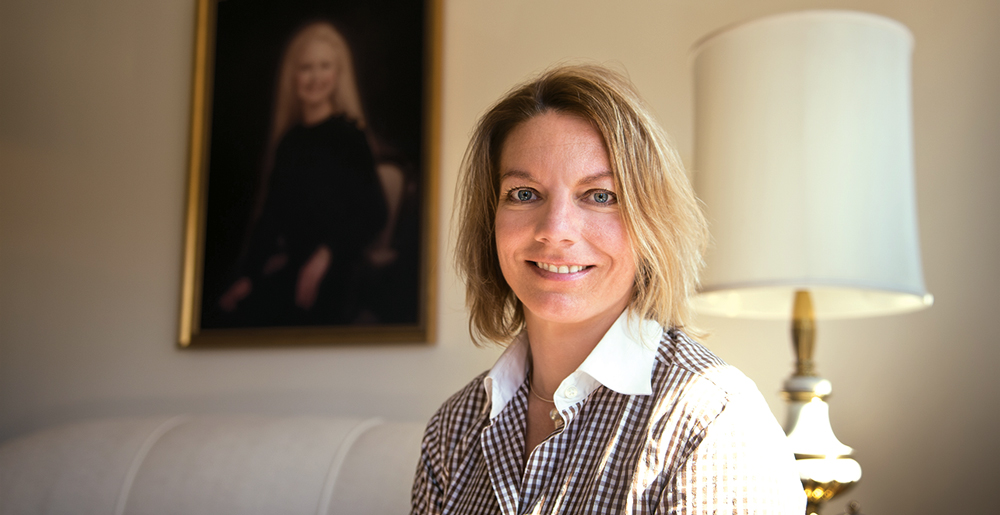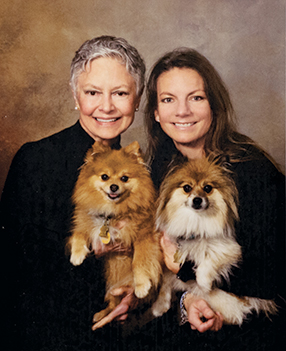
A lasting gift
Fund benefits women’s cancer advocacy and research
Roberta Schneider, an expert aesthetician and trained chemist who developed her own natural skin care techniques and product line, was devoted to educating and mentoring people – within and beyond the skin care clinic she opened in Sacramento in 1967.
That dedication and compassion led her to establish the R.J. Schneider Trust for Women’s Health Care, a legacy that, under the care of Bobbi Little, will help women with cancer.
Schneider and Little met in 1991. Although Schneider hired Little to be her personal trainer, Schneider eventually became Little’s “adopted mom,” and Little became her business partner’s health advocate.
Schneider’s cancer story began around 2003, when she began experiencing abdominal pain and belly bloating. But she wasn’t diagnosed with ovarian cancer until 2006. She underwent surgery at Sutter Health in Sacramento and had additional treatment at Stanford University. Eventually, the cancer returned.
In 2010 Schneider transferred her medical care to UC Davis Comprehensive Cancer Center, where she received treatment from gynecologic oncologist Susannah Mourton, who has since left UC Davis.
Schneider was stoic, and an easy patient, Little recalls.
“Every doctor loved her and her drive, tenacity and passion for learning,” she says. “She was just a wonderful, intelligent, caring woman with a great sense of humor.”
That same blend of tenacity and compassion strengthened Schneider’s desire to advocate for and help other women with cancer, even as her own health waned. She wanted to use her own experience with cancer to give back.
She and Little established the trust in 2011. Through Schneider’s estate and fundraising efforts, including a bike ride, the trust donated $250,000 to the UC Davis Comprehensive Cancer Center to support ovarian cancer research. (Another fundraising bike ride is tentatively scheduled for this summer.)
Early cancer detection — particularly for ovarian cancer — remains a vital theme. “Roberta wanted to create a place where women can learn about cancer and are taught to recognize signs and symptoms,” Little says. “We learned through her cancer. It’s a shame we didn’t catch it quick enough. She would still be here.”
“It is unfortunate that most women with ovarian cancer will be diagnosed with advanced-stage disease,” says Gary Leiserowitz, professor and chief of gynecologic oncology at UC Davis. “The symptoms and signs of ovarian cancer are often non-specific or confused with conditions other than ovarian cancer, both by patients and their physicians.”
He adds that although there are no currently effective screening tests for ovarian cancer, earlier detection is feasible if patients and their doctors consider the diagnosis as a possibility and investigate with a pelvic exam and pelvic ultrasound.
A devoted and astute businesswoman for 45 years, Schneider had many talents. She loved dining out and gardening as well as music, particularly the violin, which she had to give up in the later years of her illness, due to neuropathy.
“Roberta was stubborn; she wanted to fight it until the end,” Little says. “No wheelchairs, no walkers, and no oxygen!”
When the wheels finally fell off, as Little puts it, Mourton helped them with palliative care for Schneider. During that time, Little hosted a stream of Schneider’s clients, each of whom got about five minutes with Schneider to say their goodbyes.
Schneider died in her home, exactly as she wanted, in March 2011. One month later, Little threw a celebration of life party, attended by about 400 people.
Shortly after Schneider’s passing, Schneider’s trust began building steam. Little set up a cozy meeting area in the J Street location where Roberta J. Schneider Inc. is housed. Little’s preparation is paying off, continuing to bolster the trust. She hopes to make the trust a nonprofit organization and a haven for women living with cancer by offering resources, education and support as well as bringing in educators — doctors, nurses, and other experts — on a regular basis to discuss prevention and detection.
“We lost a good woman,” Little says. “But her legacy lives on. And that’s our goal, for the R.J. Schneider Trust for Women’s Health Care and UC Davis Comprehensive Cancer Center to find common ground in helping educate all women on all forms of cancer, not just ovarian.”
“Ovarian cancer research is an important focus of our investigations at UC Davis,” says Leiserowitz. “Current projects include developing a potential diagnostic blood test for ovarian cancer, investigating clinical and molecular factors associated with long-term survival, and contributing to cooperative group clinical trials to evaluate the best therapies.”
Michele Steiner, associate director of development for the cancer center, says that philanthropic support like Schneider’s is essential to advancing the cancer center’s mission to provide excellent patient care and innovative research.
“We are truly grateful,” Steiner says, “that Roberta recognized the importance of establishing the Roberta J. Schneider Memorial Fund to benefit advocacy and research on women’s cancers.”

